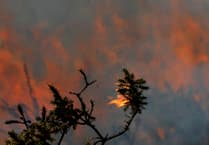WRITER and environmental campaigner, Guy Shrubsole is coming to Calstock Arts later this month to talk about his latest book on temperate rainforests.
Guy’s book, The Lost Rainforests of Britain explores and maps these lost ecosystems that may once have covered up to one-fifth of Britain and discusses how we might help to restore them.
Guy’s interest in temperate rainforests was sparked when he moved from London to Devon in 2020.
Guy said: ‘I’d known a little about them from living in mid Wales some years ago, but I didn’t really think that they were widespread across western Britain until I moved to Devon. I started to explore them in-between lockdowns and just started to have my eyes open to how amazing these habitats were.’
Temperate rainforests can be recognised through their visible green sheen with an array of lichens, mosses and ferns that can be seen growing on their branches and trunks. An example being Wistman’s Wood that can be found on Dartmoor.
Guy spoke of the value of these rainforests on Dartmoor and across Britain.
‘They’re amazing and incredibly important for the crises we’re facing as a society’, said Guy.
‘Firstly, if you look at biodiversity overall, they support something like 500 species of lichens and hundreds of species of mosses, and the fungal life that live in them gives rise to habitats that are amazing for various rare and declining species of birds and invertebrates such as the Blue Ground Beetle. So amazing for biodiversity, and also they are really important for storing carbon and helping to fight climate change.’
Aside from the ecological and environmental value of protecting and restoring these lost rainforests, Guy also explained that they have an important historical and cultural significance too.
‘I got fascinated by the history of them’, said Guy.
‘I think they’re really important because people have lived alongside them for thousands of years and they’ve been written in the background of our myths and legends and stories so I think they have a really important heritage and cultural value.
‘Sometimes people think that nature and humanity are kind of separate, but I think they’re completely interwoven and that shows in the way in which past socities have perhaps lived closer to nature and have written stories about these wonderful woodlands.’
Guy wishes to increase awareness of the value of these ecosytems and encourage action to be taken.
‘In doing these maps for the book, something like three quarters of all the temperate rainforests we think are left in England aren’t actually protected. So that’s really concerning because at the very minimum we need to protect the little we have left and going from there we need to take much more concerted action to tackle some of the big threats they face such as invasive rhododendron. We see lots of that in Cornwall and Devon, it thrives in the wet west and makes it a very troublesome plant. We also need to take action against excessive grazing on the edges of our temperate rainforests because ultimately they will be much more healthy ecologically- speaking if they’re allowed to spread and reconnect again.
‘It’s important people are aware of them and take action to help protect them, both if they are landowners and farmers or if they’re members of the public wanting to get in touch with MPs or the Government to call for more action. I think the Government needs to be doing a lot more and we’re starting to see some moves towards that.
‘There’s definitely some great work starting to be done.’
Guy will be delivering his talk at Calstock Arts on February 16 and there will be a question and answer session at the end of his talk. Guy expressed that he is looking forward to the event and speaking with the Tamar Valley communities.
‘I’m very keen to see what people have to say and chat with people at the event. Calstock and the Tamar Valley clearly have the right climate for this wonderful habitat to thrive and to see what can be done.’





Comments
This article has no comments yet. Be the first to leave a comment.